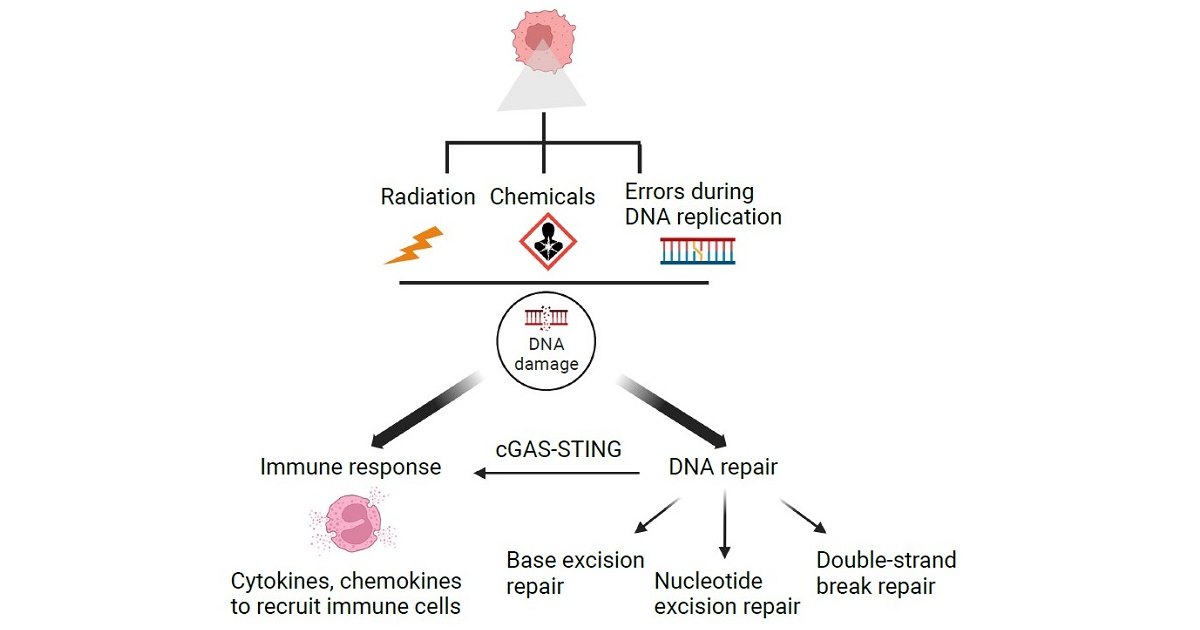DNA Damage, DNA Repair and Immune Responses
A special issue of DNA (ISSN 2673-8856).
Deadline for manuscript submissions: closed (30 September 2023) | Viewed by 730

Special Issue Editor
Interests: cancer pathogenesis; genomics; tumor suppressor genes, DNA damage and repair; genetic and epigenetic alteration and drug resistance; anti-cancer drug screening
Special Issues, Collections and Topics in MDPI journals
Special Issue Information
Dear Colleagues,
DNA damage can arise from a variety of external and internal factors, including exposure to radiation, chemicals, and reactive oxygen species. This damage can result in mutations and genetic instability, increasing the risk of cancer and other diseases. Fortunately, cells possess several mechanisms to repair damaged DNA, such as base excision repair, nucleotide excision repair, and double-strand break repair. These mechanisms are essential for removing or replacing damaged DNA, restoring the correct sequence, and preventing further harm.
When DNA is damaged, the immune system can be activated, recognizing the damaged DNA as foreign and mounting a response to eliminate it. This immune response involves the activation of various immune cells, including T cells and B cells, as well as the release of cytokines and other signaling molecules.
The interplay between DNA damage, DNA repair, and immune responses is vital for maintaining genomic integrity and preventing the development of diseases such as cancer.
Dr. Yuqian Yan
Guest Editor
Manuscript Submission Information
Manuscripts should be submitted online at www.mdpi.com by registering and logging in to this website. Once you are registered, click here to go to the submission form. Manuscripts can be submitted until the deadline. All submissions that pass pre-check are peer-reviewed. Accepted papers will be published continuously in the journal (as soon as accepted) and will be listed together on the special issue website. Research articles, review articles as well as short communications are invited. For planned papers, a title and short abstract (about 250 words) can be sent to the Editorial Office for assessment.
Submitted manuscripts should not have been published previously, nor be under consideration for publication elsewhere (except conference proceedings papers). All manuscripts are thoroughly refereed through a single-blind peer-review process. A guide for authors and other relevant information for submission of manuscripts is available on the Instructions for Authors page. DNA is an international peer-reviewed open access quarterly journal published by MDPI.
Please visit the Instructions for Authors page before submitting a manuscript. The Article Processing Charge (APC) for publication in this open access journal is 1000 CHF (Swiss Francs). Submitted papers should be well formatted and use good English. Authors may use MDPI's English editing service prior to publication or during author revisions.
Keywords
- DNA damage
- DNA repair
- genetic instability
- cGAS-STING
- cytokines
- innate immunity
Benefits of Publishing in a Special Issue
- Ease of navigation: Grouping papers by topic helps scholars navigate broad scope journals more efficiently.
- Greater discoverability: Special Issues support the reach and impact of scientific research. Articles in Special Issues are more discoverable and cited more frequently.
- Expansion of research network: Special Issues facilitate connections among authors, fostering scientific collaborations.
- External promotion: Articles in Special Issues are often promoted through the journal's social media, increasing their visibility.
- Reprint: MDPI Books provides the opportunity to republish successful Special Issues in book format, both online and in print.
Further information on MDPI's Special Issue policies can be found here.



